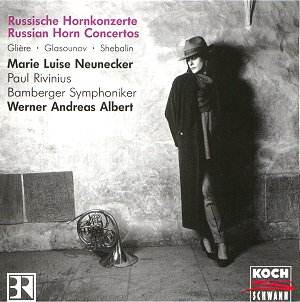 |
EDITOR'S CHOICE
|
 |
RUSSIAN HORN CONCERTOS
Reinhold GLIERE (1875-1956)
Horn Concerto (1950)
Four Pieces for horn and piano (1908)
Alexander GLAZUNOV (1865-1936)
Reverie; Serenade; Idyll
(1884-1890)
Vissarion SHEBALIN (1902-1963)
Horn Concertino (1930)
 Marie Luise Neunecker (French
Horn)
Marie Luise Neunecker (French
Horn)
Paul Rivinius (piano)
Bamberg SO/Werner Andreas Albert
rec 1992/1993, Bamberg, Bayerischer Rundfunk
 KOCH SCHWANN 3-1357-2 H1
[65.37]
KOCH SCHWANN 3-1357-2 H1
[65.37]
Amazon UK

Neunecker has, with minimal publicity, gradually tackled much of the neglected
20th century repertoire for French Horn. Not all that long ago she recorded
the Schoeck and Ethel Smyth concertos for Koch.
The Gliere was, in the 1950s, made famous within the USSR by an LP of the
composer directing the Bolshoi orchestra accompanying the dedicatee, Valery
Polekh. The Concerto radiates old-fashioned sun-warmed Germanic romanticism
courtesy of Schumann and adds to the 'soup' a measure of Tchaikovskian delirium.
The 'Hollywood' sentimentality of the strings at 3.55 in the andante is
as close as you can get to Korngold without being Erich Wolfgang. The cadenza
in the long Allegro (I) is a conflation of Neunecker and Polekh. The
'troika' allegro of the finale is straight out of Prince Igor.
It is pleasantly poetic rather than outright compelling although there are
some commanding moments (5.30) in the finale. Pleasant poetry also sums up
the neatly rounded little pieces for horn and piano. Rivinius's pianism is
extremely sophisticated in its moment by moment responsiveness to the horn.
The music is in style with the Rachmaninov preludes.
Glazunov's three pieces are most lovingly done. These are fragile, musically
speaking, and only the most sympathetic culture will allow them to speak
as they do here. The Reverie must surely have taken the famous horn
solo from Tchaikovsky's Fifth as its point of departure in much the same
way as the Serenade relates to the second movement of the Fourth.
The Idyll is a seven minute andante. There are no abrasive edges to
Neunecker's playing and she is ideally partnered.
Shebalin is rather well represented on the excellent Olympia label where
one collection includes this Concertino alongside a number of other substantial
works. This is much better recorded and an antidote to romantic noodling.
Although it certainly has its share of 'waldlied' it is also lively and even
pungently vehement (cf Walton's Scapino). Shebalin was condemned for
formalism in the late 1940s and stripped of his academic posts. The
silver-threaded lyricism of this music implies a sort of Soviet John Ireland
although the finale is closer to de Falla and Shostakovich.
This is a first class collection which is obscure only because its virtues
have not been 'trumpeted'. Koch seem to get precious little attention in
the media.
Neunecker is a musician of outstanding musicality and technical brilliance.
Snap it up while it is still available.
Rob Barnett

